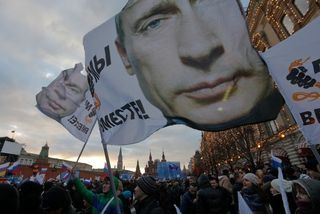
Gregor Peter Schmitz interviews George Soros in the NY Review of Books:
Schmitz: As we speak, European finance ministers are in the process of concluding an agreement on the banking union. What do you think of it?
Soros: In the process of negotiations, the so-called banking union has been transformed into something that is almost the exact opposite: the re-establishment of national “silos,” or separately run banks. This is a victory for Orwellian newspeak.
Schmitz: What’s wrong with it?
Soros: The incestuous relationship between national authorities and bank managements. France in particular is famous for its inspecteurs de finance, who end up running its major banks. Germany has its Landesbanken and Spain its caixas, which have unhealthy connections with provincial politicians. These relationships were a major source of weakness in the European banking system and played an important part in the banking crisis that is still weighing on the eurozone. The proposed banking union should have eliminated them, but they were largely preserved, mainly at German insistence.
Schmitz: That is a pretty drastic condemnation. How do you justify it?
Soros: In effect, the banking union will leave the banking system without a lender of last resort. The proposed resolution authority is so complicated, with so many decision-making entities involved, that it is practically useless in an emergency. Even worse, the ECB is legally prohibited from undertaking actions for which it is not expressly authorized. That sets it apart from other central banks, which are expected to use their discretion in an emergency.
But Germany was determined to limit the liabilities that it could incur through theECB. As a result, member countries remain vulnerable to financial pressures from which other developed countries are exempt. That is what I meant when I said that over-indebted members of the EU are in the position of third-world countries that are overindebted in a foreign currency. The banking union does not correct that defect. On the contrary, it perpetuates it.
Schmitz: You sound disappointed.
Soros: I am. I left no stone unturned trying to prevent this outcome, but now that it has happened, I don’t want to keep knocking my head against the wall. I accept that Germany has succeeded in imposing a new order on Europe, although I consider it unacceptable. But I still believe in the European Union and the principles of the open society that originally inspired it, and I should like to recapture that spirit. I want to arrest the process of disintegration, not accelerate it. So I am no longer advocating that Germany should “lead or leave the euro.” The window of opportunity to bring about radical change in the rules governing the euro has closed.
Schmitz: So, basically, you are giving up on Europe?
Soros: No. I am giving up on changing the financial arrangements, the creditor–debtor relationship that has now turned into a permanent system. I will continue to focus on politics, because that is where I expect dramatic developments.
More here.
